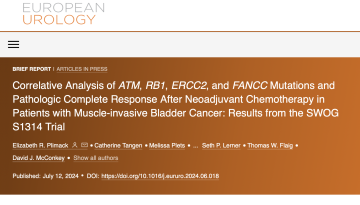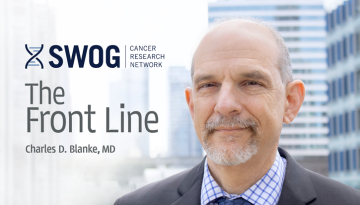Who Are We? Please Help Us Find Out!
One year ago SWOG launched a project to help us better answer the question: who are we?
Our member profiles project went public on March 31, 2023, with a guest Front Line post from Dr. Don Dizon, our vice chair for diversity, equity, inclusion, and professional integrity. He wrote eloquently about why we initiated this project, seeing it as a key piece of our larger effort “to ensure that who we are and what we offer to our patients is both inclusive and representative of the world around us.” I encourage you to reread his post.
I’m happy to report that, one year later, phase I of our member profiles project is live.
If you’re a SWOG member, you should have recently received an email inviting you to complete your profile. If such an invitation hasn’t arrived but you believe it should have, reach out to profiles@swog.org (after scanning your spam folder, please).
Completing the profile is entirely voluntary, and most questions include an “I prefer not to answer” type of option. But the more information you provide, the more clearly we will be able to see the contours of our current SWOG membership and leadership.
In addition to questions about your professional role, your areas of concentration and interest, and your work location, the profile also asks for demographic information: your age, your racial and ethnic background, whether you are a veteran, and what accessibility needs you have for events.
The professional information you enter will eventually be viewable by other logged-in SWOG members, but your data on age, race, ethnicity, accessibility needs, and veteran status will be accessible only by SWOG’s vice chair of DEII or as part of aggregated data in a report. You can learn more by exploring the project’s Frequently Asked Questions.
If you haven’t yet completed your profile, please log in to the SWOG website, follow links to the Directory, and look for the “My Profile” links. Or just click here now. Our goal is to have most members complete their profile by the end of April.
To ensure we’re able to keep your information as secure as possible, you can reach your profile only by logging in with credentials linked to your NCI CTEP account – either via CTEP-IAM authentication or with CTEP-linked ID.me credentials. If you discover that your CTEP password has expired or run into other difficulties on this front, here’s guidance on how to troubleshoot your CTEP account.
The next phases of the project, which will include questions on gender identity and sexual orientation, should be deployed later this year.
I want to thank Dr. Dizon for providing the vision driving this initiative, and Rick Bangs, chair emeritus of our patient advocate committee, for leading the project.
Thanks also to the application development team at Cancer Research and Biostatistics (CRAB) who built the database and interfaces, keeping data privacy and security needs paramount (of course, CRAB has decades of experience doing precisely this).
SWOG’s commitment to promoting diversity, equity, and inclusion (DEI) in our organization and our research remains undiminished. I’ll close here with another quote from Dr. Dizon, who wrote inspiringly of our goal of integrating “DEI principles into our membership, our work, and our trials, so that people with cancer, their advocates, and their loved ones characterize SWOG as a place where they are seen and heard.”
See you next week!
___________________________________________________
Trial of the Week
S1937: A Phase III Randomized Trial of Eribulin with Gemcitabine versus Standard of Care (Physician’s Choice) for Treatment of Metastatic Urothelial Carcinoma Refractory to, or Ineligible for, Anti PD1/PDL1 Therapy
This trial in metastatic urothelial carcinoma closed temporarily last spring. The protocol was revised in response to new FDA approvals in this disease and to reduce the needed sample size, speed enrollment, and generate an earlier answer to questions about the role of eribulin-based therapy in this setting.
S1937 reopened last month as a two-arm rather than three-arm study, with its enrollment goal reduced from the previous 465 patients to the current target enrollment of 184 patients.
The revised study compares the combination of eribulin plus gemcitabine against standard-of-care treatment. The previous version included a third arm testing eribulin alone.
Also added in this revision is a fourth standard-of-care option for patients on the control arm – sacituzumab govitecan is now also allowed (the other three options are docetaxel, gemcitabine, and paclitaxel).
S1937 was activated in early 2021 and has enrolled 25 patients toward its new goal of 184 enrollments. It has been opened at almost 400 sites.
Sarmad Sadeghi, MD, PhD, is S1937 study chair, and Primo N. Lara, Jr., MD, is co-chair. The top-accruing institution on the trial is USC Norris Comprehensive Cancer Center, followed closely by the Cancer Center at Saint Josephs and UC-Davis Comprehensive Cancer Center.
If S1937 hasn’t been on your radar recently, now is the time to revisit it. It’s a leaner, quicker trial, but its central question remains critical.
Learn more on the SWOG S1937 page or the CTSU S1937 page.
Other Recent Stories



